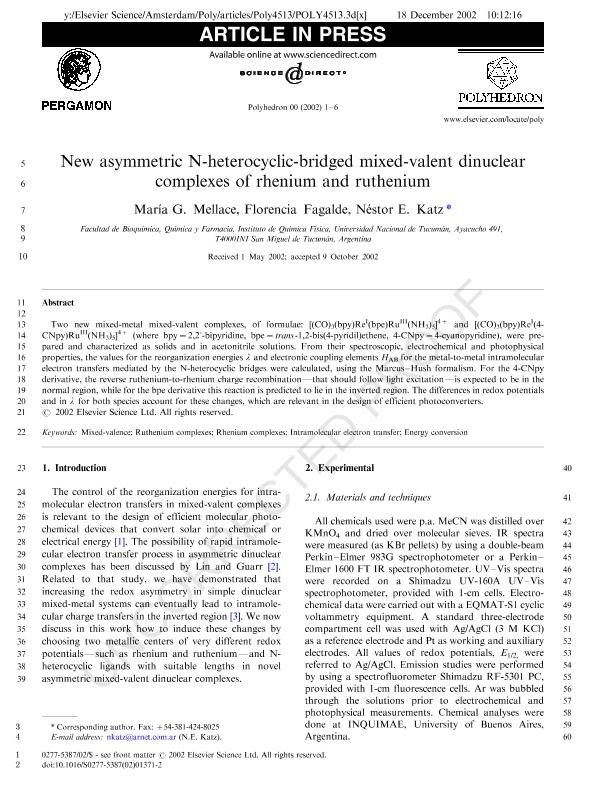Mostrar el registro sencillo del ítem
dc.contributor.author
Mellace, Maria G.
dc.contributor.author
Fagalde, Florencia

dc.contributor.author
Katz, Néstor Eduardo

dc.date.available
2016-08-04T19:24:12Z
dc.date.issued
2013-12
dc.identifier.citation
Mellace, Maria G.; Fagalde, Florencia; Katz, Néstor Eduardo; New asymmetric N-heterocyclic-bridged mixed-valent dinuclear complexes of rhenium and ruthenium; Elsevier; Polyhedron; 22; 3; 12-2013; 369-374
dc.identifier.issn
0277-5387
dc.identifier.uri
http://hdl.handle.net/11336/6936
dc.description.abstract
wo new mixed-metal mixed-valent complexes, of formulae: [(CO)3(bpy)ReI(bpe)RuIII(NH3)5]4+ and [(CO)3(bpy)ReI(4-CNpy)RuIII(NH3)5]4+ (where bpy=2,2′-bipyridine, bpe=trans-1,2-bis(4-pyridil)ethene, 4-CNpy=4-cyanopyridine), were prepared and characterized as solids and in acetonitrile solutions. From their spectroscopic, electrochemical and photophysical properties, the values for the reorganization energies λ and electronic coupling elements HAB for the metal-to-metal intramolecular electron transfers mediated by the N-heterocyclic bridges were calculated, using the Marcus–Hush formalism. For the 4-CNpy derivative, the reverse ruthenium-to-rhenium charge recombination—that should follow light excitation—is expected to be in the normal region, while for the bpe derivative this reaction is predicted to lie in the inverted region. The differences in redox potentials and in λ for both species account for these changes, which are relevant in the design of efficient photoconverters.
dc.format
application/pdf
dc.language.iso
eng
dc.publisher
Elsevier

dc.rights
info:eu-repo/semantics/openAccess
dc.rights.uri
https://creativecommons.org/licenses/by-nc-nd/2.5/ar/
dc.subject
Mixed-Valent
dc.subject
Ruthenium Complexes
dc.subject
Rhenium Complexes
dc.subject
Intramolecular Electron Transfer
dc.subject
Energy Conversion
dc.subject.classification
Química Inorgánica y Nuclear

dc.subject.classification
Ciencias Químicas

dc.subject.classification
CIENCIAS NATURALES Y EXACTAS

dc.title
New asymmetric N-heterocyclic-bridged mixed-valent dinuclear complexes of rhenium and ruthenium
dc.type
info:eu-repo/semantics/article
dc.type
info:ar-repo/semantics/artículo
dc.type
info:eu-repo/semantics/publishedVersion
dc.date.updated
2016-07-25T19:30:01Z
dc.journal.volume
22
dc.journal.number
3
dc.journal.pagination
369-374
dc.journal.pais
Países Bajos

dc.journal.ciudad
Amsterdam
dc.description.fil
Fil: Mellace, Maria G.. Universidad Nacional de Tucuman. Facultad de Bioquimica, Quimica y Farmacia. Instituto de Quimica Fisica; Argentina
dc.description.fil
Fil: Fagalde, Florencia. Universidad Nacional de Tucuman. Facultad de Bioquimica, Quimica y Farmacia. Instituto de Quimica Fisica; Argentina. Consejo Nacional de Investigaciones Científicas y Técnicas. Centro Científico Tecnológico Tucumán. Instituto de Quimica del Noroeste; Argentina
dc.description.fil
Fil: Katz, Néstor Eduardo. Universidad Nacional de Tucuman. Facultad de Bioquimica, Quimica y Farmacia. Instituto de Quimica Fisica; Argentina. Consejo Nacional de Investigaciones Científicas y Técnicas. Centro Científico Tecnológico Tucumán. Instituto de Quimica del Noroeste; Argentina
dc.journal.title
Polyhedron

dc.relation.alternativeid
info:eu-repo/semantics/altIdentifier/doi/http://dx.doi.org/10.1016/S0277-5387(02)01371-2
dc.relation.alternativeid
info:eu-repo/semantics/altIdentifier/doi/10.1016/S0277-5387(02)01371-2
dc.relation.alternativeid
info:eu-repo/semantics/altIdentifier/ark/http://www.sciencedirect.com/science/article/pii/S0277538702013712
Archivos asociados
